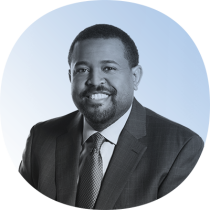The Clippers' dynasty that never was: 'Maybe we weren’t good enough’
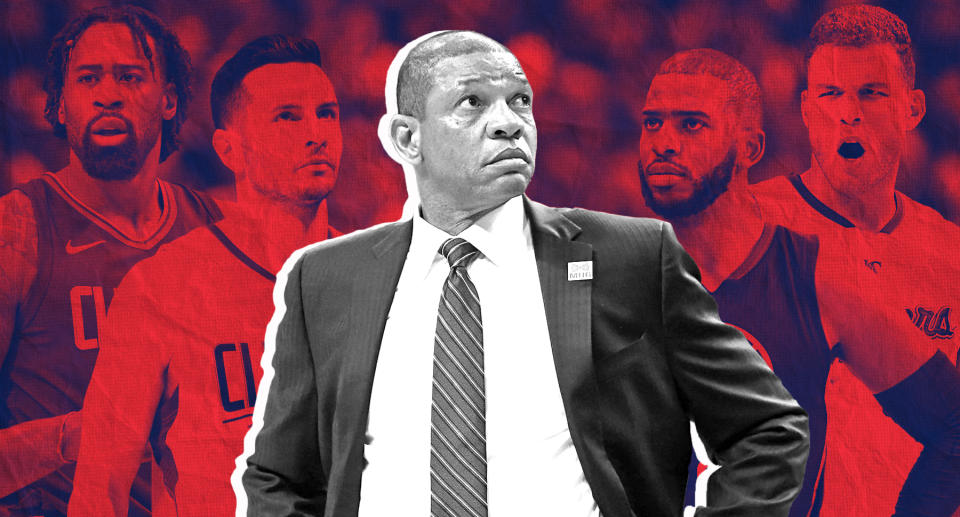
LOS ANGELES — They had a nickname before they’d even played a game. The Los Angeles Clippers were so accustomed to failure that even the smallest of victories was often cause for celebration. But they had a legitimate reason for jubilation on Dec. 12, 2011, when they acquired Chris Paul in a controversial trade that — for once — gave them an edge over the crosstown-rival Lakers. DeAndre Jordan was on the phone, in shock, when he got wind of the deal executed between the NBA — which ran the New Orleans Hornets at the time — and a franchise that seemed stuck forever. And Blake Griffin was so excited, he jumped, side-bumped Jordan and shouted, “It’s going to be Lob City!”
Lob City became a movement that gave Clippers fans a chance to come out of hiding and rock red, white and blue without shame in a purple-and-gold town. The Clippers had a future Hall of Fame point guard and two of the most athletic big men in the game, including one who could hurdle a car. They later had basketball fans feeling sorry for Brandon Knight after Jordan threw down a dunk so vicious that it sent Knight crashing to the floor. They made Andrew Bynum embarrassed for Pau Gasol after Griffin used a running-back quality stiff arm before dunking all over him. They turned routine fastbreak opportunities into mixtape moments, with Jamal Crawford going between the legs before tossing a pass over his head for another Jordan dunk. They were fun. They were exciting. And they soon hated the nickname.
Several times, the Clippers tried to run from Lob City because they felt marginalized by what it implied. They did more than dunk. They had skill. They executed with precision. They didn’t want to be the NBA’s version of cotton candy — a sugar rush of highlight dunks and regular-season wins followed by an unsettling crash. They wanted to be taken seriously, but each disappointing postseason failure made it easier to dismiss them.
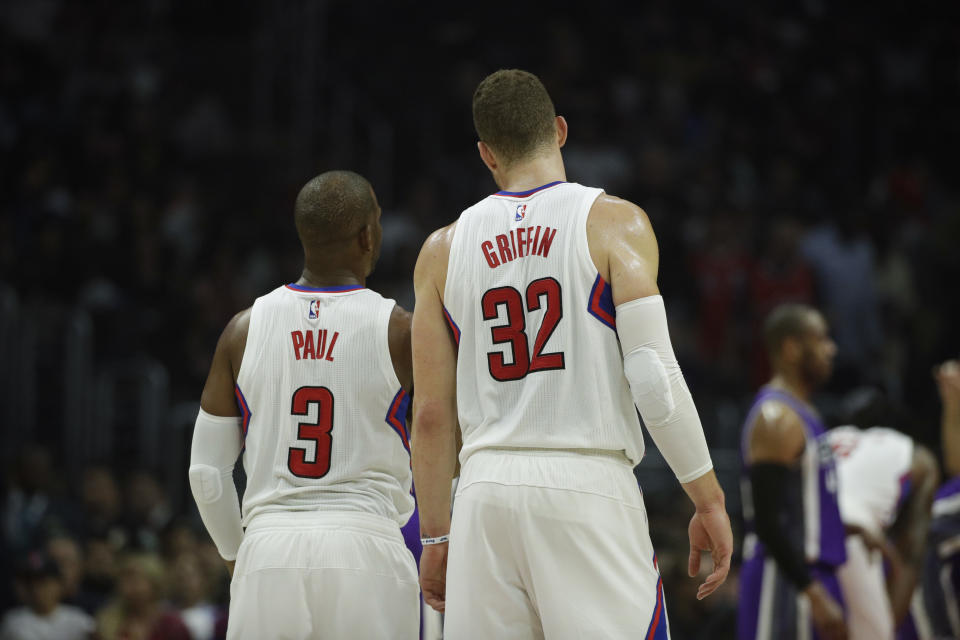
They were entertaining but eventually the Golden State Warriors surpassed them on the must-watch list and as a feared contender. They were dynamic but never when it counted. They had so much misfortune that it stopped being coincidence. They were together longer than they needed to be, too stubborn to recognize or confront what had become obvious to most everyone else until it was much too late. And by the end, the game had left them behind.
Lob City finally came to a close when Paul, the man responsible for so many of the well-placed alley-oops, bypassed an easy, gargantuan payday and placed it on the back burner to pursue something more meaningful and fulfilling. Paul forced a trade to the Houston Rockets last June, leaving in shambles the most successful six-year run in the Clippers’ less-than-storied history. Griffin and Jordan remain from a team that — for myriad reasons — was never more than a tease, with a legacy almost as empty as the nickname from which they could never escape.
“You look at the past five years, what have we really accomplished? I think the reason people were calling for us to break up, or blow it up, or move on, or whatever it was, is because we haven’t accomplished anything,” Griffin told The Vertical. “I think after you’re here for five or six years and everybody is dogging you and going through the misery of losing in the playoffs, four or five years, I think it wears on you.”
A series of unfortunate events
The Clippers’ greatest and most tangible victories never occurred on the court. Winning the draft lottery that resulted in Griffin is still recognized in the trophy case at the team’s practice facility in Playa Vista. But the Paul trade was an unexpected triumph given that it came just days after NBA commissioner David Stern had disallowed a deal that would’ve shipped Paul to the Lakers.
“Let’s be honest, the Clippers hadn’t had much of a successful history before that. They had a history, but I wouldn’t call it a successful history,” former Clippers coach Vinny Del Negro told The Vertical. “We were trying to not only start a new era with Blake Griffin and build something special with the Clippers on a consistent basis. And that’s really what happened. We felt like Chris was the guy who could make everything work.”
Del Negro was the first coach tasked with turning the Griffin-Paul tandem into a contender but was replaced by Rivers after just two seasons. Unwilling to be part of a rebuilding effort in Boston, where he led the Celtics to their 17th NBA championship, Rivers pushed for a trade to the Clippers, added the title of team president and immediately raised the expectations for the organization. Rivers’ arrival signaled yet another win for the franchise. He placed more responsibility on Jordan, proclaiming him as the third piece in a Big Three along with Griffin and Paul. And he also challenged the team’s long-held regard for the Lakers by demanding that their championship banners and retired jerseys were covered up by Clippers images at home games at Staples Center, the arena the two teams shared. The aesthetics and the attitude had changed, but the Clippers’ best season over the next four years was only a one-game improvement from Del Negro’s final year.
Based on regular-season success, the Lob City Clippers would rank among the best teams over the past six years. Their total of 313 wins is tied with Oklahoma City for the third-most, trailing only San Antonio (353) and Golden State (328). Among those four teams, the Clippers were the only one to never reach the NBA Finals or make at least two trips to the conference finals. The Clippers also joined San Antonio as the only team to win at least 50 games in each of the past five seasons. Those wins, however, never translated in the postseason, where they were just 24-33 and kept banging their heads at the second-round ceiling.
The easy way to dismiss their playoff misery is to point to the untimely injuries — especially to Griffin, who either was sidelined or hobbled by a debilitating setback in half of their six postseason appearances. But there were two instances when the Clippers had no one to blame but themselves for some inexplicable meltdowns. They remain the last Western Conference team to defeat the Warriors in the playoffs, in 2014, and it also denied Tim Duncan his last chance to win back-to-back titles, in 2015, but what followed after each of those series will continue to haunt the franchise for some time.
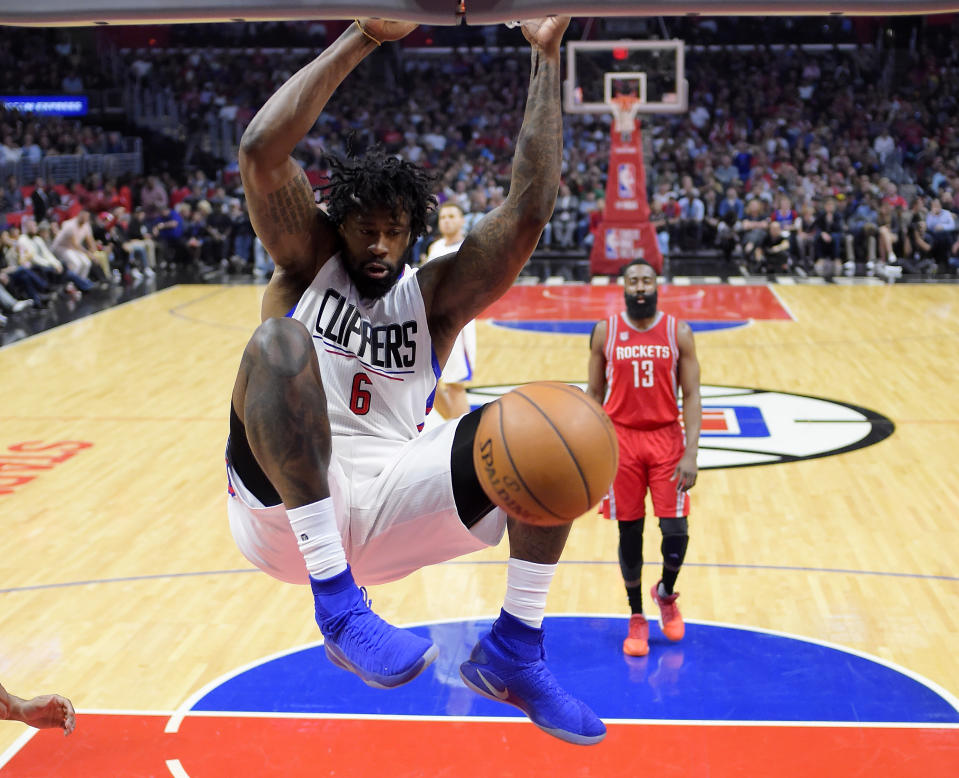
Two weeks after surviving a racially inappropriate incident involving former owner Donald Sterling that could’ve broken them, the Clippers didn’t have enough to put away Oklahoma City in 2014. Tied 2-2 and on the road, the Clippers led by 13 points with 4 minutes, 13 seconds remaining and by seven with 49 seconds left and still lost. Paul had a stunning meltdown in which he turned over the ball twice and fouled Russell Westbrook on a 3-point attempt in the final 17 seconds.
“As I’m watching the game, I couldn’t believe it. I really couldn’t believe it,” Jared Dudley, a member of that Clippers squad, told The Vertical. “I knew when we were on the plane back home, we were emotionally done. That team gambles, but it was dead silent. It was none of, ‘Ok, we lost but we’re going to come back and get it.’ We were playing cards, no one said a word. You could hear a pin drop in that plane.”
Rivers tried to compare the incident to Isiah Thomas’ critical turnover at Boston Garden in 1987 because Thomas rebounded by leading Detroit to the next three NBA Finals, winning two titles. Paul never recovered and neither did the Clippers. “Everybody talks about that game. In Game 6, we were up [16] in the second quarter. So we had a chance to win Game 6 and force a Game 7,” J.J. Redick, now in Philadelphia after a four-year run in Los Angeles, told The Vertical.
Caron Butler signed with the Clippers as a free agent in 2011 because “they were bad for so long, I knew the vibe was going to change at some point.” But he wouldn’t accept that the franchise was cursed, even though he happened to be playing for Oklahoma City when Paul led that debacle. “I was out there on the floor. For me, it was great,” Butler told The Vertical. “But I’m a strong believer in energy and I just felt the energy for them was really distrurbed so many times. It was functional. It was like, ‘We’re good enough because we’re talented enough to compete with so many people, as the Clippers.’ But I think they probably reached their ceiling.”
The next season, the Clippers upset the defending champion Spurs in seven games and had a 3-1 series lead over Houston in the second round but blew a 19-point lead in the final 15 minutes in Game 6 at home. Paul had missed the first two games of the Rockets series with a hamstring injury and the Clippers simply lacked the depth to withstand a seven-game fight.
The Clippers’ bad luck had never been more blatant than in 2016, when they won their first two games against the Portland Trail Blazers but lost both Griffin and Paul to injury in Game 4 of a series they eventually lost in six games. Those injuries were ill-timed for several reasons, not the least of which was that they happened on the same day the 73-win Warriors — whom the Clippers would’ve faced in the second round with a series win — announced that unanimous MVP Stephen Curry would miss at least two weeks with a sprained knee. For 12 hours, the Clippers had hope but caught the worst of breaks before waking up the next morning with none.
Cracks in the foundation
The dynamic between Paul, Griffin and Jordan was always dissected but not easy to decipher. Paul was easily the most established player when Lob City was formed, but Griffin and Jordan, who were extremely close, both eventually came into their own. Paul liked Griffin and Jordan personally but their personalities clashed, with the meticulous Paul hating to lose while Griffin and Jordan were cool with winning. Paul has a reputation for being one of the more controlling and demanding leaders in the game, with his detail-oriented approach making it difficult for another style to permeate the locker room.
Though the Clippers probably needed Griffin to assume more ownership of the team, especially in bigger moments to relieve Paul of the pressure he felt to lead, he typically just deferred to avoid any conflicts. “I didn’t really look at it on those terms, deferring or not,” Griffin told The Vertical. “I think that’s what CP does best, he controls tempos of games, and controls the flow and all that. Whenever you have a player and that’s one of their main strengths, I’m not going to try to step in and take that away, just out of ego or whatever it is. I don’t look at it as deferring, I look at it as being a teammate and realizing what your role is on a team.”
The beginning of the end for the Clippers perhaps came during those five days in the summer of 2015, when Jordan left in free agency to join the Dallas Mavericks. Jordan felt slighted and unwanted, which led to his brief departure, but the Clippers took drastic measures to remind him of his importance with a highly publicized hostage situation in which Paul, Griffin, Redick, Paul Pierce and Rivers invaded Jordan’s home until he backtracked on his commitment to the Mavericks and stayed. “That didn’t affect the team,” Crawford, who joined Minnesota during the offseason, told the Vertical. “The way it played out, it may have brought more jubilation. Because you think, ‘He’s here, now he’s gone, and now, oh, he’s back.’ It definitely didn’t affect us in a negative way, ‘Like, dang, he did us dirty and he left.’ It wasn’t nothing like that, so that’s a good thing.”
Crawford may have downplayed the effect on the team, but the Clippers’ streak of three consecutive seasons with at least 56 wins came to end, beginning what would be an injury-plagued and ignominious campaign for Griffin.
Griffin showed tremendous restraint throughout his career, especially when opponents challenged him with excessive contact or hard fouls. But in the midst of his most challenging season with the Clippers, Griffin lost his cool during a late-night altercation in January 2016 with his friend and team assistant equipment manager Matias Testi outside of a restaurant in Toronto. Griffin was already out with a quad injury but extended his time away from the team by breaking his hand during the fight, which resulted in a suspension. During that stretch, teams started reaching out in an effort to trade for Griffin, which would prove futile. The Clippers had a winning record without Griffin, but his teammates welcomed him back, realizing the team could only go so far without him.
“I think for us, obviously, Blake is our brother,” Crawford told The Vertical. “And you’ve got to take the good with the good and the bad with the bad. You can’t say he’s our brother when things are going well but then when things aren’t, you’re like, ‘Hey, I disown him.’ Nah. Those two were really close. Like really close, it would’ve been like any brothers that got into a scrap, but the whole world found out about it on social media.”
Dudley didn’t need much more than one forgettable season with the Clippers to recognize that the team had some problems that winning wasn’t going to be able to remedy. They were known throughout the league as front-runners but the togetherness was often lacking off the court and when problems arose on the court. “It was a team when they had the lead, the energy they had was crazy. We dominated people. We beat people by 20 or 30. But when stuff started going the other way, we were one of the worst teams in the NBA,” Dudley told The Vertical, “because people complained to refs, argued with each other and the energy around that team when it goes wrong was not good at all.”
Dudley added that the Clippers rarely hung out as a team, recalling just one group dinner in his lone season in 2013-14. “I was running into people at dinner, like, ‘What, no invite?’ It was very cliquish. I really believe a team that doesn’t hang out together and doesn’t like each other, it’s hard to win, especially when you have stars.”
Rivers’ inability to find the right supporting cast for his stars plagued his tenure as team president. He found a sharpshooting backcourt mate for Paul in Redick, but could never solve the problem at small forward, where Matt Barnes was often the default choice when other options, such as Dudley, didn’t work out. Later experiments with Lance Stephenson and Jeff Green failed. Crawford, a three-time Sixth Man of the Year, was inherited from the previous regime and Rivers was never able to secure the necessary depth needed to keep up with other elite teams. The Clippers were also tested by an unprecedented situation when Rivers made a trade for his son, Austin, giving him a chance to resuscitate a career that had foundered. Glen “Big Baby” Davis, a former Celtic who reunited with Rivers in Los Angeles, was one of the more outspoken members of the arrangement, which led to resentment among some players who felt Austin was granted preferential treatment from the rest.
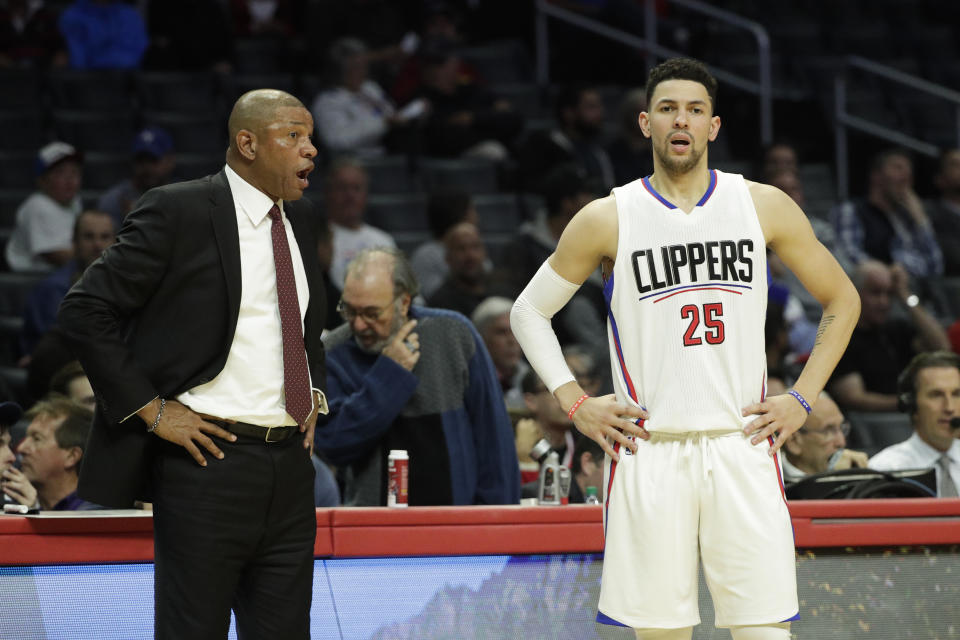
Paul reportedly had issue with Austin, especially after Doc Rivers was unable to make a rumored deal for Carmelo Anthony that would’ve sent Austin Rivers, Paul Pierce and Crawford to New York. Rivers denies that he rejected a deal in order to keep his son and takes issue with criticism of Austin and how he coached him. “I don’t think we’ve really heard a former player actually say that. It was reported,” Rivers told The Vertical. “I think Austin, it will always be unfair to him, throughout his career. He was a McDonald’s All-American. I guess that was because of me. The game-winning shot against North Carolina? Somehow I made that shot. He was drafted 10th. I guess that was me, too. He’s always got to deal with extra crap. He’s an easy target. It’s very easy for reporters. Use his name, and you’ll get hits. I’ve told Austin this a lot. ‘Is it a fair shake? But the lifestyle you’ve been able to live growing up, you had that advantage.’ ”
Heading for a change
As they came together during the 2016 offseason, the Clippers were spent. Jordan, Griffin, Rivers and Steve Ballmer, the enthusiastic owner who purchased the team from Sterling in 2014 for $2 billion, met with Kevin Durant during free agency but were unable to prevent him from choosing the Warriors. Durant’s decision extended the separation between the two organizations that were once considered rivals. With Griffin and Paul both having options on their contracts and Redick also set to enter free agency in 2017, the Clippers couldn’t avoid the distracting feeling that the end was near.
“Our spirit was missing. I thought no one was in last year. I could feel that as a coach,” Rivers told The Vertical. “I thought we had too many guys on the fence. You’re never going to win with fence riders. You’re either in, or you’re out.”
Redick could also sense that something was off. “There wasn’t a lot of joy. And not just me. I don’t think for anybody. I think it’s one of the reasons Chris left. That’s not a knock on anybody. I just didn’t feel like we had fun playing together. … I also think in that stretch of time, the league changed. The philosophy of the league changed. The way the Warriors played and even the way the Rockets played changed. By the end, I don’t know that we had enough firepower to knock those teams off. It’s math.”
Griffin missed at least 15 games for the third consecutive season, but the Clippers still managed to win 51 games and earn home-court advantage in their first-round series against the Utah Jazz. For the second straight postseason, Griffin got injured, sustaining a plantar plate injury on his big toe that required season-ending surgery and contributed to the Clippers losing in seven games. “Kind of a freak incident,” Griffin told The Vertical. “Obviously, you never expect injury, but it just comes out of nowhere and all of a sudden your season is over and you’re watching your guys. So that’s probably been the thing that’s been the toughest over the past two years. Just having to sit there and watch those guys keep fighting without you.”
Paul could’ve opted out of his contract and re-upped for a five-year deal worth more than $200 million but instead decided it was time to leave, believing that the Clippers had no chance of competing for anything of consequence. “It was tough because I was grounded there, my family was there and stuff like that. I had just moved my in-laws out there in January,” Paul told The Vertical.
“Chris is thinking about his legacy,” Butler told The Vertical. “‘I’m a guy who is going to be a future Hall of Famer. I’ve never been to the Finals, the Western Conference finals.’ I think it’s a great opportunity for him with [Mike] D’Antoni and the Houston Rockets to play his style and preserve his career.”
Rivers wasn’t exactly surprised when Paul informed the organization of his desire to move on and play in Houston. “I didn’t know if he was going to or not, but I definitely didn’t think it was a sure thing that he was coming back. I leaned more the other way,” Rivers told The Vertical. “I thought Chris wanted a change. I thought he was tired of my coaching. At times, guys want to hear another voice.”
In a three-part docu-series for ESPN, Paul explained that “the culture of our team” would eventually lead him to look elsewhere to pursue his ultimate goal. Paul often wondered if Rivers’ desire to win a second title matched — or exceeded — Paul’s desire to win his first. To Paul, the move should end any perceptions that he carried any special pull within the organization.“The team was constructed around me? What show did I run? I was the point guard on that team. Doc was the leader of that team,” Paul told The Vertical.
Ballmer relieved Rivers of his decision-making duties last August, naming Lawrence Frank as the team’s general manager. Jerry West, the architect of some of the best teams in NBA history, was also lured away from the Warriors, signaling a new direction for the franchise. Before finding success in Boston, Rivers had to deal with his own inability to break through as a player. Rivers spent his first eight years in Atlanta, playing alongside Dominique Wilkins, and the Hawks never got past the second round of the playoffs. He was injured when his Knicks reached the NBA Finals in 1994 and was denied another trip when the Spurs lost in the conference finals the next year. Lob City was supposed to be different.
“The vision that I had, I was going to win a title with Chris, Blake and D.J. and whoever else we had in that group. We obviously never got that done. My goals haven’t changed. I don’t coach for any other reason,” Rivers told The Vertical. “Sometimes you change because you want to. Sometimes, it’s forced change. But at the end of the day, most of the time, change is good. Whether you want it or not. We’ve done a lot of winning, we just weren’t a winner. At some point, you’ve got to come to the realization with that group, you’re probably not going to be a winner. If you’re good enough, you better break through, because if you don’t do it, there are no guarantees in this game. Maybe we weren’t good enough.”
Popular video from The Vertical:
